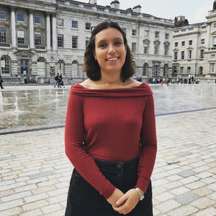
Durham University, Chemistry (MChem), 2:1 hons, 2016.
University of Cambridge, PGCE, 2016/2017.
Receiving a Royal Society of Chemistry scholarship was crucial in my decision to train via the PGCE route. As well as ensuring that I was financially capable of another year of study, the RSC provided me with excellent training sessions throughout the year focusing on different aspects of Chemistry teaching. I was also able to meet and network with other Chemistry scholars and experienced teachers, which was invaluable in terms of sharing ideas and supporting each other through the course. The RSC also provided lots of resources for our classrooms, CPD opportunities online, and I am hoping to use my link with the RSC to organise school trips in the future. Application for the scholarship was straight forward; an online application stage followed by an interview and assessment day in London.
Whilst at university, I helped with science outreach projects which I really enjoyed. I also volunteered during the summer working with vulnerable young people, as well as various child care jobs. I knew that I really enjoyed working with children, so I signed up for a “Chemistry into Schools” module in my third year at university. Initially disappointed that there were no places in primary schools, I nervously started a placement at a secondary school. I loved the atmosphere of a secondary school, as well as the more challenging concepts taught and the wider range of experiments you could do with secondary aged pupils. By the time I finished my Chemistry degree, I had decided that I wanted to become a Science teacher.
If you are considering teaching (you should – its great), try and get experience of working with different age groups if you can. I initially was certain I wanted to teach primary aged children, but a placement at a local secondary school completely changed my mind. In terms of maintaining a work-life balance during training, my advice would be: plan something fun each week with friends/family, try and keep up a sport, never work on Saturdays and make the most of the holidays!
I chose to complete my teacher training via the PGCE route, as I wanted to ensure that I was able to focus on pedagogical research as well as putting it into practice in the classroom. When applying, I used the Get Into Teaching website as well as speaking to recent graduates and former teachers about their routes into teaching. I enjoyed writing my personal statement and pulling together the experiences and reasons that had drawn me to teaching in the first place. I would recommend getting as much experience with young people as possible (both inside and out of the classroom), both to confirm whether teaching is what you want to do and to discuss in your application.
The most valuable lesson I learnt during my training, is that the relationships that you form with pupils is the most important part of teaching. Taking the time to build positive relationships (which can be challenging at times!) can transform the quality of teaching. I trained in two completely different schools, which was invaluable as it meant I had to learn how to adapt my teaching style early on. Time spent in faculty and carrying out research projects in school allowed me to really think about how children learn, and how we as teachers can best facilitate this in the classroom. Having time to reflect on my lessons allowed me to continually evaluate and improve my teaching practice.
I am currently completing my NQT year in a mixed inner city comprehensive. I teach seven classes, from Year 7 – 12 as well as being a Year 9 form tutor. Since starting in September, I have been able to put into practice teaching strategies I learnt in my PGCE year both at university and through the scholarship programme. I have also learnt a great deal from the excellent team of teachers I work with, and continue to receive NQT training as well as the guidance and support of a mentor. Although teaching can be stressful, it is incredibly rewarding to be a part of shaping young people’s futures, and inspiring the next generation of problem solvers!